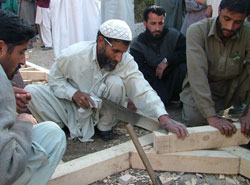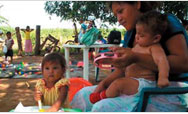You are here » Home » Telling Our Story
Success Story
Hands-on workshops teach better building techniques and skills
Learning to Build Stronger Homes

| |
Photo: USAID/Kaukab Jhumra Smith
|
|
Mohammed Bashir, a carpenter from Kaleri village in Pakistan’s northeastern Bagh district, learns to make struts to support a wooden post for a house. He is among hundreds of craftsmen trained in earthquake-resistant construction by USAID.
“We want to learn about the mistakes we made before so we don’t make them again,” says Mohammed Saqlain Baig, a mason from Nariola, a village in northeastern Pakistan. Baig attended a USAID-sponsored training workshop to learn techniques for building earthquake-resistant homes.
|
Before a devastating earthquake struck Bagh District in northern Pakistan in October 2005, few residents knew their homes sat on unsafe ground. Most homes were built without structural bracing for walls and roofs — walls were often supported by round, uncut stones packed with mud. Masons rarely reinforced stone structures and carpenters did not fortify timber joints with metal strips or other supports. Large concrete buildings used inadequate steel support. This lack of awareness of sound building practices contributed to more than 8,100 deaths in the district alone. “Earthquakes don’t kill people,” explained Kubilay Hicyilmaz, an earthquake engineer, “buildings kill people.”
As the time for rebuilding approaches, increasing local expertise in earthquake-resistant building practices becomes critical to stronger, safer reconstruction. USAID decided to sponsor a series of four-day workshops in Bagh District aimed at training masons and carpenters in safer building practices. By May 2006, nearly 300 craftsmen across six regions had been trained in earthquake-resistant design. Many of them used their new skills to build transitional housing and classrooms for schools.
Word of the workshops is spread by local radio broadcasts and community leaders. The workshops include morning seminars, where workers critique photos of local structures, and hands-on afternoon exercises. Craftsmen learn the causes of earthquakes, how to select the right site for a home, and how to safely align a structure on that site. Classes also cover timber construction, masonry, and reinforced concrete construction, ensuring that workers develop a well-rounded understanding of safe practices. Those who complete all four days receive a certificate and $17. In addition, the workshops keep earthquake-safe models on display for others to study.
M. Saqlain Baig, a mason from Nariola, found the hands-on practice the most valuable. “Doing it yourself is different from simply listening to a lecture,” Baig said. “We’ve learned a lot of new techniques to make stronger houses for this area.” Using their new skills, builders in Pakistan will be able to construct a safer structures for future generations.
Print-friendly version of this page (483kb - PDF)
Click here for high-res photo
Back to Top ^ | 

